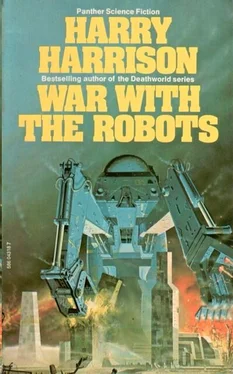Гарри Гаррисон - War with the Robots
Здесь есть возможность читать онлайн «Гарри Гаррисон - War with the Robots» весь текст электронной книги совершенно бесплатно (целиком полную версию без сокращений). В некоторых случаях можно слушать аудио, скачать через торрент в формате fb2 и присутствует краткое содержание. Жанр: Фантастика и фэнтези, на английском языке. Описание произведения, (предисловие) а так же отзывы посетителей доступны на портале библиотеки ЛибКат.
- Название:War with the Robots
- Автор:
- Жанр:
- Год:неизвестен
- ISBN:нет данных
- Рейтинг книги:5 / 5. Голосов: 1
-
Избранное:Добавить в избранное
- Отзывы:
-
Ваша оценка:
- 100
- 1
- 2
- 3
- 4
- 5
War with the Robots: краткое содержание, описание и аннотация
Предлагаем к чтению аннотацию, описание, краткое содержание или предисловие (зависит от того, что написал сам автор книги «War with the Robots»). Если вы не нашли необходимую информацию о книге — напишите в комментариях, мы постараемся отыскать её.
War with the Robots — читать онлайн бесплатно полную книгу (весь текст) целиком
Ниже представлен текст книги, разбитый по страницам. Система сохранения места последней прочитанной страницы, позволяет с удобством читать онлайн бесплатно книгу «War with the Robots», без необходимости каждый раз заново искать на чём Вы остановились. Поставьте закладку, и сможете в любой момент перейти на страницу, на которой закончили чтение.
Интервал:
Закладка:
War with the Robots
Harry Harrison
A WORD FROM THE (HUMAN) AUTHOR…
WHEN MOST PEOPLE HEAR THE WORD robot , they have a reflexive metal picture of a mechanical man, all creaking joints and glowing eyes. This really wasn’t what Karel Capek had in mind when he invented the word for his play R.U.R. soon after the First World War. His robots— Rossum’s Universal Robots —were flesh and blood, though artificially made, and identical with normal placental-people in every way except for their complete lack of emotions. The new word robot filled a need, and was gratefully seized by the science fiction writers and soon mutated to be- come the mechanical man with the steel skin. (Capek’s flesh- and-blood robots are now called androids .) At the same time, in applied engineering, robot has become an inclusive term for an entire new family of gadgetry.
Just as tools and weapons — hammers, saws, swords and such — are a direct extension of man’s physical abilities, robots are an extension of the higher and more abstract functions. The robot pilot, who flies the plane for far longer periods than the human pilot, has delicate powers of discrimination and choice. Even the first crude models could detect and correct deviations from level flight before a human pilot could even sense them, while the newer, sophisticated models turn and bank the plane at the touch of a single button. This process of sensing and deciding is what separates the robots from the insensate machines. An alarm clock is a machine — but an automatic clock-radio is a robot. It may not look like one, but it has the functions. It soothes its master to sleep with soft music, then turns off the sound until the correct time in the morning when he should be awakened. There would be no trick at all to enlarging its field of operation. Instead of a radio this machine could play records: Brahms at night, Sousa in the morning. And instead of switching off at night after a fixed interval, the music could continue playing softly until the master was completely asleep — the robot determining this fact by a thermocouple in the bed that would detect the lowering of body temperature that accompanies sleep. If master wished to arise at dawn there would be no need for him to check the almanac every night for the correct time; a simple photoelectric cell sensitive to light would take care of that. All of these gadgets — instead of being built into a black box — could be housed in a metal torso, the thermo-couple in the end of one finger, the photoelectric cells in place of eyes. Instead of internal switching it could reach out a hand to turn on the music, even pull up the shade if need be.
I personally feel no burning desire to have a truncated metal man hovering over my bed at night, metal finger gently prodding my flesh and unsleeping eyes watching for the sight of dawn. Though in essence it would still be the same machine that now turns the music on and off for me.
Call my attitude emotional — but don’t call it exceptional. We have long tended to anthropomorphize our mechanical devices; giving our cars names, cursing, coaxing — and occasionally kicking — recalcitrant machines. We are even getting used to the services of robots and are beginning to take them for granted too. What child has not been fascinated by the moron-level robot in the refrigerator who turns the light off when we close the door? Does the robot always turn it off? That train of thought can keep one up nights figuring out ways to find out.
Have you ever ridden in one of those completely automatic elevators they are beginning to install in the big office buildings? A single master control starts and stops an entire bank of elevators, programming frequent trips when the traffic is heavy and fewer in the slow periods. Passengers are counted and the doors closed when the car is full. Speed and braking are adjusted to the weight so that the doors will always open flush with the floor outside. Some of the elevators even have a recorded voice (appropriately firm) that orders the hoggish rider to stay clear of the doors if he is preventing their closure. The elevator-controlling robot is built into the wall and sends and receives all of its commands electronically. If we wanted it to conform to the classic picture of a robot it would do the same job — though perhaps not as efficiently — in the form of a machine man who snapped its fingers at the metal operators of the cars. All of this would be very dramatic, yet would not alter the basic robot-control situation in the slightest.
The robots have arrived and are here to stay, deeply entrenched already in the arts of war and peace. A little anti-social and suicidal robot named proximity-fuse rides in cannon shells and can’t stand being next to anyone else. If he is, he blows up. Another robot can dip the bright lights on your car, raising them again when the other car is by, though he is a bit on the stupid side and blinks happily up and down at brightly lit signs. Robot telephone operators are better, cheaper and faster than human ones, though harder to argue with. Robot parking lots have arrived that will whisk your automobile away upon presentation of a coin, and bring it back (hopefully) when you present the right identification. In the home, robot controlled stoves are so commonplace that we take them for granted.
Robots are here to stay all right — but what impact are they going to have on our human society? Will they wreak death and destruction like Victor Frankenstein’s creation? Or will they take over the world like their progenitors in R.U.R.? Will they be willing serfs or metal masters? Or more subtly, will they assure our physical needs to such a degree that the human race will wallow in slothfulness, degenerate and perish. Anything’s possible, of course; and in these stories I talk about a few of the possibilities. Some pleasant possibilities, and some rather nasty ones, too. Take your pick…
The first creature from earth to set foot-or treads-onto the moon will be a robot. It is in the design stage now and careful plans are being made for it to stroll around, sample the geology, search for life forms, examine the surface and measure the radiation of the moon. And of course send the information home. Unlike a man, the robot will then peacefully squat down and sit unmoving for all eternity, eye lenses staring without interest at its home world in the sky above. This little exploration-robot is so attractive a design that it has already caused a schism among the ranks of the scientists as to the necessity of sending men to the moon at all. But I think there is little doubt as to the outcome of that argument. I don’t remember any ticker-tape parades for robots. Rockets will reach the moon and the planets and, though there will be many robots aboard, there will also be at least one man. It will be hard to keep him alive, warm and comfortable-but he’ll be there…
SIMULATED TRAINER
MARS WAS A DUSTY, FRIGID HELL. Bone dry and blood red. They trudged single file through the ankle-deep sand, and in a monotonous duet cursed the nameless engineer who had designed the faulty reconditioners in their pressure suits. The bug hadn’t shown during testing of the new suits. It appeared only after they had been using them steadily for a few weeks. The water- absorbers became overloaded and broke down. The Martian atmosphere stood at a frigid-60°centigrade. Inside the suits, they tried to blink the unevaporated sweat from their eyes and slowly cooked in the high humidity.
Morley shook his head viciously to dislodge an itching droplet from his nose. At the same moment, something rust-coloured and furry darted across his path. It was the first Martian life they had seen. Instead of scientific curiosity, he felt only anger. A sudden kick sent the animal flying high into the air.
Читать дальшеИнтервал:
Закладка:
Похожие книги на «War with the Robots»
Представляем Вашему вниманию похожие книги на «War with the Robots» списком для выбора. Мы отобрали схожую по названию и смыслу литературу в надежде предоставить читателям больше вариантов отыскать новые, интересные, ещё непрочитанные произведения.
Обсуждение, отзывы о книге «War with the Robots» и просто собственные мнения читателей. Оставьте ваши комментарии, напишите, что Вы думаете о произведении, его смысле или главных героях. Укажите что конкретно понравилось, а что нет, и почему Вы так считаете.










